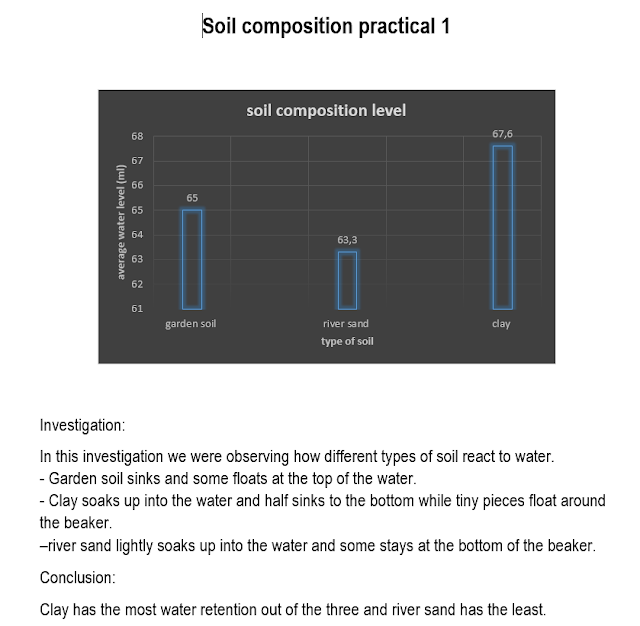SOIL PRACTICAL 1
INSTRUCTIONS:
INSTRUCTIONS:
1. Apparatus used
2. Test tube
3. Beaker
4. Spatula
·
In
this practical you are going to observe the composition of a soil sample that
you have collected from your garden or area.
·
Your
teacher will also do this as a demonstration
·
Obtain
a sample of soil enough to ¼ fill a large test tube.
Aim: To observe
the composition of sand, clay and silt and other particles in a sample of soil.
materials
per group:
1
large test tube or measuring cylinder with stoppers/plugs or plastic wrap.
Test
tube rack
1
sample of garden soil
spatula
Water
Ruler
Permanent
marker
|
UPLOADED BY JONATHAN BORDER / LAWRENCE MASHA
_________________________________________________________________________
SOIL PRACTICAL 2
___________________________________________________________________________
SOIL IN WINDOW GARDENS
The soil we used is definitely going to work for our window gardens, as tested in the practicals, showing that the soil has enough nutrients, and components for the plants to grow in our next project, window gardens. We tested soil composition, soil retention, and also soil texture, after finally testing them all, we came to the conclusion of that the soil used in the practicals was good enough to grow our pllants in in the window gardens.
_________________________________________________________________________
SOIL PRACTICAL 2
INSTRUCTIONS:
- In this
practical you are going to learn how to classify soil samples from two different
sites, according to size and learn to feel different soil textures.
materials per Group:
Hand lenses
2 x soil samples, collected by the
groups
Newspapers
Spatulas
Petri dishes
water
|
AIM: Learn how to classify soil samples from two different sites, and learn to feel different soil textures.
RESULTS: Our soil made a medium time ribbon, and then after establishing what type of ribbon it made, we went on to see what type of soil we were using, by observing the texture of our soil. We came to the conclusion that the soil felt very gritty, which meant it was sandy/clay/loam soil. We established our results using the flow chart.
Photo of our soil used in practical 2, when we had
formed it into a ribbon, after adding water
Another photo from practical 2 with different soil ribbon
UPLOADED BY JOSEPH PEPLER
_______________________________________________________________________
SOIL PRACTICAL 3
INSTRUCTIONS:
materials:
INSTRUCTIONS:
· In
this practical you are going to test the water retention capacity of two soil
types that you have collected from your garden or area.
· Your
teacher will set up a similar demonstration using 3 soil types which you can
use as a reference for this practical.
Aim: To determine how much water there
is in two unknown soil samples.
materials:
|
100 ml of soil sample 1
100 ml soil sample 2
200 ml water
2 Measuring cylinders
2 x 100 ml glass beakers
2x 200ml glass beakers
Measuring spoons
2 glass or plastic funnels with
filter paper
Spatulas
Permanent markers
|
___________________________________________________________________________
SOIL IN WINDOW GARDENS
The soil we used is definitely going to work for our window gardens, as tested in the practicals, showing that the soil has enough nutrients, and components for the plants to grow in our next project, window gardens. We tested soil composition, soil retention, and also soil texture, after finally testing them all, we came to the conclusion of that the soil used in the practicals was good enough to grow our pllants in in the window gardens.





No comments:
Post a Comment